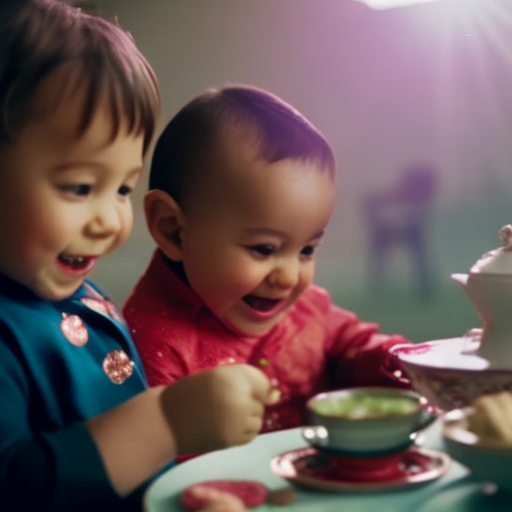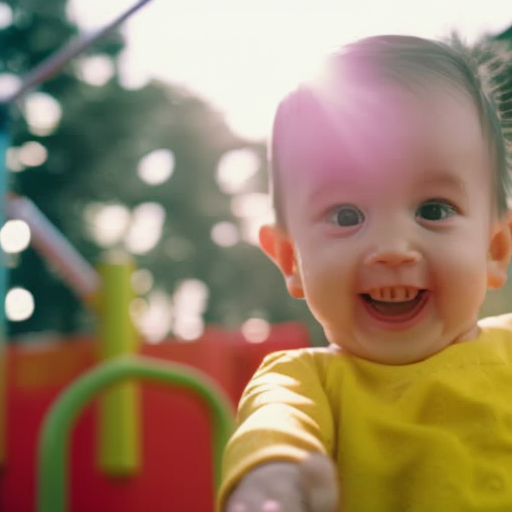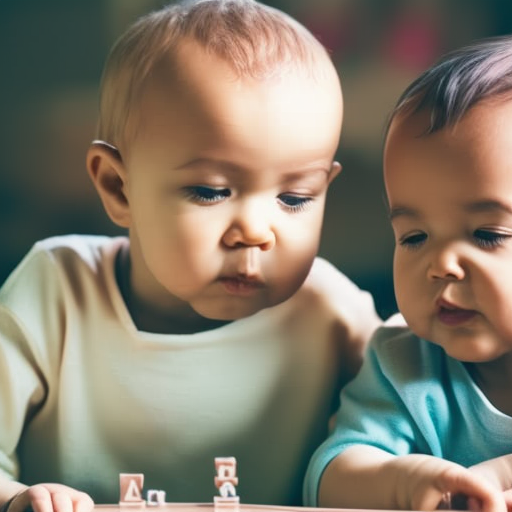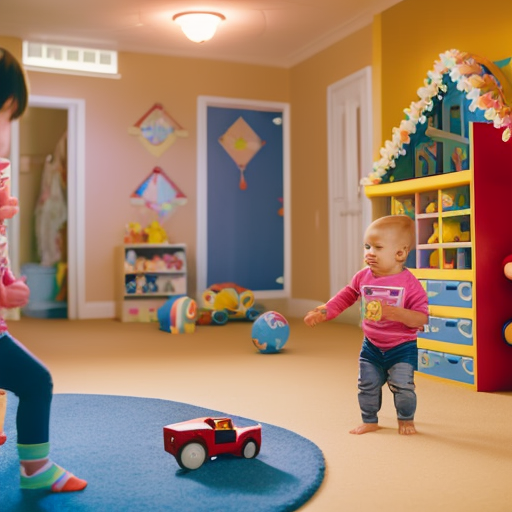"Cherishing Little Steps - A Haven for Baby and Family Journeys"
Promoting Positive Interaction in Toddlers
As you watch your toddler explore the world with wide-eyed wonder, you can’t help but wonder how to promote positive interaction in their young lives. Coincidentally, fostering healthy social and emotional development during these formative years lays the foundation for their future relationships and overall well-being.
But where do you begin? How can you ensure that your little one grows up to be empathetic, kind, and confident?
In this discussion, we will explore practical strategies and expert advice to help you navigate the world of positive interaction in toddlers. Get ready to discover the secrets to nurturing your child’s social skills, emotional intelligence, and problem-solving abilities, all while creating a positive environment that will have lasting effects throughout their lives.
Key Takeaways
- Positive interaction and building trust and connection with toddlers is essential for their social, emotional, and cognitive growth.
- Engaging in responsive and nurturing interactions strengthens the parent-child bond and shows the child that they are supported and cared for.
- Interactive play, cooperation, and problem-solving promote the development of social skills and enhance cognitive abilities in toddlers.
- Encouraging emotional expression, empathy, and kindness helps toddlers develop emotional intelligence, navigate conflicts constructively, and build healthy connections with others.
The Importance of Positive Interaction

Positive interaction is crucial for the healthy development and well-being of toddlers, as it fosters their social, emotional, and cognitive growth. As a parent or caregiver, your involvement in your toddler’s life plays a vital role in promoting positive interactions. Research has shown that parental involvement, such as engaging in responsive and nurturing interactions, has a profound impact on a child’s overall development.
When you actively participate in your toddler’s playtime, it not only strengthens the parent-child bond but also enhances their cognitive abilities. By providing a supportive and stimulating environment, you can encourage your child’s curiosity and creativity. Through interactive play, you can help them develop problem-solving skills, language abilities, and emotional regulation.
In addition to parental involvement, peer relationships also play a significant role in the positive interaction of toddlers. Encouraging your child to interact with other children their age can help them learn important social skills, such as sharing, taking turns, and empathy. It also provides them with opportunities for cooperation and conflict resolution, which are essential for their emotional development.
Building Trust and Connection
To further cultivate positive interaction in toddlers, it’s crucial to focus on building trust and connection between you and your child. Developing healthy attachments and building strong foundations will lay the groundwork for a loving and secure relationship.
Here are three key ways to build trust and connection with your toddler:
-
Be present and responsive: Show your child that you’re there for them by being fully present in their lives. Respond promptly to their needs, whether it’s a hug when they’re upset or a smile when they achieve something new. Your consistent presence and responsiveness will help your child feel secure and valued.
-
Engage in meaningful play: Play is an essential part of a child’s development, and it also serves as a powerful bonding tool. Take the time to engage in play with your toddler, following their lead and showing genuine interest in their activities. By joining them in their world of play, you’re sending a message that you value their interests and enjoy spending time with them.
-
Create routines and rituals: Establishing daily routines and special rituals can provide a sense of stability and predictability for your child. Whether it’s a bedtime routine or a weekly family movie night, these shared experiences help strengthen the bond between you and your toddler. Consistency in these routines and rituals will foster a sense of security and trust.
Building trust and connection with your toddler takes time and effort, but the rewards are immeasurable. By developing healthy attachments and building strong foundations, you’re nurturing a relationship that will positively impact your child’s overall well-being and future relationships.
Enhancing Social Skills

Enhancing social skills in toddlers can have a profound impact on their overall development and future relationships. As toddlers begin to navigate the world around them, it’s crucial to foster their ability to communicate effectively, promote cooperation, and encourage teamwork.
One key aspect of enhancing social skills in toddlers is developing their communication skills. Encouraging toddlers to express their needs and wants through words or gestures helps them build a foundation for effective communication. By actively listening and responding to their attempts at communication, you validate their feelings and encourage further interaction.
Promoting cooperation and teamwork is another essential component of enhancing social skills. Engaging toddlers in activities that require cooperation, such as building blocks or solving puzzles together, helps them learn to work collaboratively. By providing opportunities for sharing, taking turns, and problem-solving as a team, you instill the value of cooperation and promote positive social interactions.
Research shows that toddlers who possess strong social skills have better academic performance, higher self-esteem, and healthier relationships later in life. By enhancing their communication skills and promoting cooperation and teamwork, you’re laying the foundation for their future success. So, take the time to engage your toddler in activities that nurture their social skills and watch them blossom into confident, empathetic individuals who thrive in their relationships with others.
Developing Emotional Intelligence

Developing emotional intelligence in toddlers is crucial for their overall well-being and future success in relationships. By improving communication and managing emotions, toddlers can navigate social interactions more effectively and build healthy connections with others. Here are three key aspects to consider when fostering emotional intelligence in toddlers:
-
Encourage emotional expression: Provide a safe and supportive environment where toddlers feel comfortable expressing their emotions. Encourage them to use words to communicate their feelings, validate their emotions, and help them understand that all emotions are valid and normal. This will enhance their ability to articulate their needs and navigate conflicts in a constructive manner.
-
Teach empathy and perspective-taking: Help toddlers understand the emotions and perspectives of others. Engage in activities that promote empathy, such as reading books or watching movies that explore different emotions and discussing them together. Encourage toddlers to consider how their actions may impact others and teach them to show kindness and understanding towards others.
-
Model healthy emotional regulation: Toddlers learn a great deal from observing the behavior of adults around them. Demonstrate healthy ways of managing your own emotions, such as taking deep breaths or using positive self-talk when feeling upset. By modeling effective emotional regulation, toddlers can learn to recognize and manage their own emotions in a healthy manner.
Encouraging Empathy and Kindness

Encouraging empathy and kindness in toddlers is essential for fostering positive social interactions and building strong relationships with others. Teaching compassion at a young age can have a significant impact on a child’s development and their ability to navigate the social world. Research suggests that empathy can be nurtured through various strategies.
One effective way to promote empathy is by modeling it yourself. Demonstrate kindness and compassion towards others, and your toddler will learn to do the same. Encourage them to notice and acknowledge the feelings of others, helping them understand different perspectives and experiences. This can be done through storytelling or using puppets to act out situations where empathy is needed.
Another approach is promoting inclusivity. Teach your toddler to appreciate and celebrate differences in others, whether it be in terms of appearance, abilities, or cultural backgrounds. Encourage them to be kind and inclusive in their interactions with peers, emphasizing the importance of treating everyone with respect and dignity.
It is important to remember that teaching empathy takes time and patience. Reinforce positive behaviors and provide gentle guidance when your toddler struggles to understand another person’s emotions. By fostering empathy and kindness in toddlers, we can lay the foundation for a more compassionate and inclusive society.
Nurturing Self-Confidence

To foster self-confidence in toddlers, it’s crucial to create an environment that encourages exploration and independence. Here are three key ways to nurture self-confidence in your little one:
-
Encourage autonomy: Allow your toddler to make choices and decisions within safe boundaries. This helps them develop a sense of control and competence. For example, let them choose their outfit for the day or decide which toy to play with.
-
Offer praise and encouragement: Recognize your toddler’s efforts and achievements, no matter how small. This positive reinforcement boosts their self-esteem and motivates them to keep trying. Instead of just saying, ‘Good job,’ be specific and say, ‘I love how you stacked those blocks so high!’
-
Be a secure base: Establish a strong parent-child bond built on trust and love. When your toddler feels emotionally secure, they’re more likely to take risks and explore the world around them. Spend quality time together, engage in activities that they enjoy, and provide plenty of affection and reassurance.
Fostering Problem-Solving Abilities

Now that your toddler has developed a sense of self-confidence, it’s important to continue fostering their growth by nurturing their problem-solving abilities. Developing critical thinking skills and promoting collaborative problem-solving at this stage will lay a strong foundation for their future success.
Critical thinking skills are essential for toddlers to analyze situations, make informed decisions, and find creative solutions. Encourage your child to think independently by asking open-ended questions that prompt them to consider different perspectives. For example, instead of telling them how to solve a puzzle, ask them what strategies they can use to figure it out.
Collaborative problem-solving involves working together with others to find solutions. This skill not only helps toddlers in their social interactions but also enhances their cognitive development. Encourage your child to engage in activities that promote teamwork, such as building blocks or playing imaginary scenarios with their friends. This will help them develop communication skills, empathy, and the ability to compromise.
Research shows that children who possess strong problem-solving abilities tend to have higher academic achievement and better social relationships. By fostering critical thinking skills and promoting collaborative problem-solving, you’re equipping your toddler with the tools they need to navigate challenges and succeed in various aspects of life.
Creating a Positive Environment

Creating a positive environment for your toddler is crucial for their overall well-being and development. Here are three ways to promote independence and creativity in your toddler’s surroundings:
-
Design an open and safe space: Ensure your toddler has plenty of room to explore and move around independently. Arrange furniture and toys in a way that encourages exploration and imagination. Use child-safe gates or barriers to create boundaries and prevent accidents, allowing your toddler to explore freely.
-
Provide age-appropriate toys and materials: Offer a variety of toys that promote creativity and problem-solving skills. Blocks, art supplies, and puzzles are great choices. Rotate toys regularly to keep your toddler engaged and interested. Encourage open-ended play, where they can use their imagination and find different ways to play with the same toy.
-
Foster a positive and supportive atmosphere: Create an environment where your toddler feels loved, valued, and supported. Praise their efforts and accomplishments, no matter how small. Encourage their independence by allowing them to make choices and solve problems on their own. Avoid being overly critical or controlling, as it can hinder their creativity and confidence.
Long-Term Benefits of Positive Interaction

Positive interaction with toddlers has been shown to have long-term benefits for their social, emotional, and cognitive development. Building resilience and improving communication skills are two key areas that are positively influenced by consistent positive interactions.
Research has found that toddlers who experience positive interactions with their caregivers are more likely to develop a strong sense of resilience, which helps them navigate through life’s challenges with confidence and adaptability. When toddlers engage in positive interactions, such as receiving affection, praise, and encouragement, they develop a secure attachment to their caregivers. This attachment provides a strong foundation for building resilience, as it fosters a sense of trust, self-worth, and emotional stability. As a result, toddlers who’ve experienced positive interactions tend to have better emotional regulation, problem-solving skills, and coping mechanisms, which are essential for building resilience.
Furthermore, positive interactions play a crucial role in improving toddlers’ communication skills. When caregivers engage in positive and responsive interactions, toddlers learn to express themselves effectively and understand others’ emotions and intentions. This leads to better language development, as toddlers are more motivated to communicate and engage in conversations. As they grow older, these improved communication skills enable toddlers to build meaningful relationships, resolve conflicts, and succeed academically.
Frequently Asked Questions
How Can I Encourage My Toddler to Express Their Emotions Effectively?
You can encourage your toddler to express their emotions effectively by promoting empathy and teaching problem solving skills. This helps them understand and communicate their feelings, leading to positive interactions and healthier emotional development.
What Are Some Strategies for Teaching My Toddler to Share and Take Turns?
Teaching your toddler to share and take turns can be challenging, but there are strategies that can help. By modeling empathy and fostering cooperation through play and daily routines, you can encourage positive interactions and social skills.
Are There Any Specific Activities or Games That Can Help My Toddler Develop Their Social Skills?
To help your toddler develop social skills, try organizing playdates with other toddlers. Role playing activities, like pretending to be superheroes or playing house, can also foster positive interaction and teach important social cues.
How Can I Help My Toddler Build Resilience and Cope With Challenging Situations?
You can help your toddler build resilience and cope with challenging situations by providing a supportive environment, teaching problem-solving skills, and encouraging positive self-talk. These strategies can help them develop the resilience they need to face life’s challenges.
What Are Some Ways to Promote Positive Interaction Between My Toddler and Their Siblings or Peers?
To promote positive interaction between your toddler and their siblings or peers, encourage open communication and create a supportive environment. Teach them to share, take turns, and resolve conflicts peacefully. Remember, "A smile goes a long way."
Conclusion
Congratulations! You’ve just unlocked the secret to raising a perfectly flawless toddler! By promoting positive interaction, you can ensure your child becomes a social genius, emotional mastermind, and problem-solving prodigy.
Who needs mistakes and challenges when we can create a bubble of constant positivity? Forget about resilience, growth, and learning from failures.
Let’s all strive for a world where toddlers never experience anything less than rainbows and unicorns. Because who needs real-life skills when we can have a toddler utopia?


